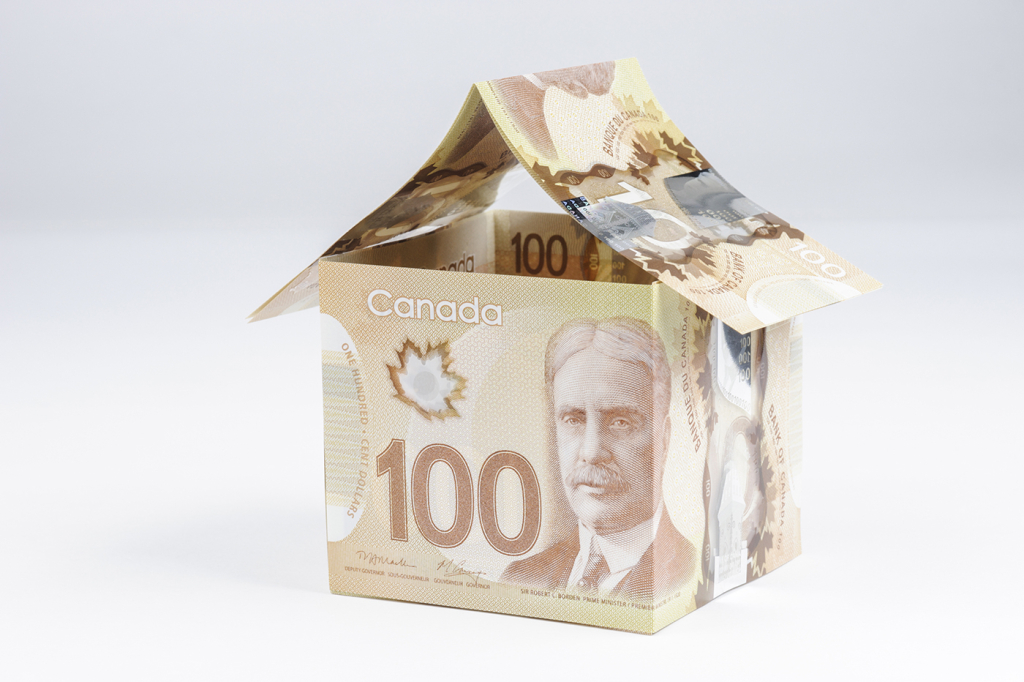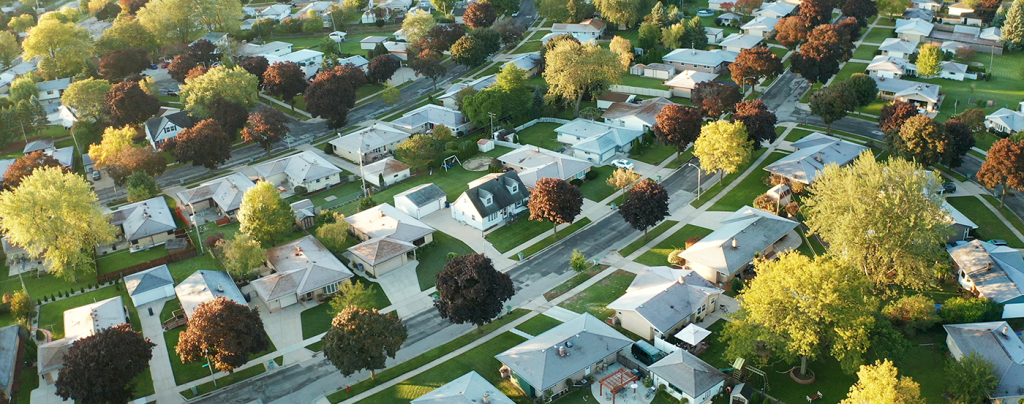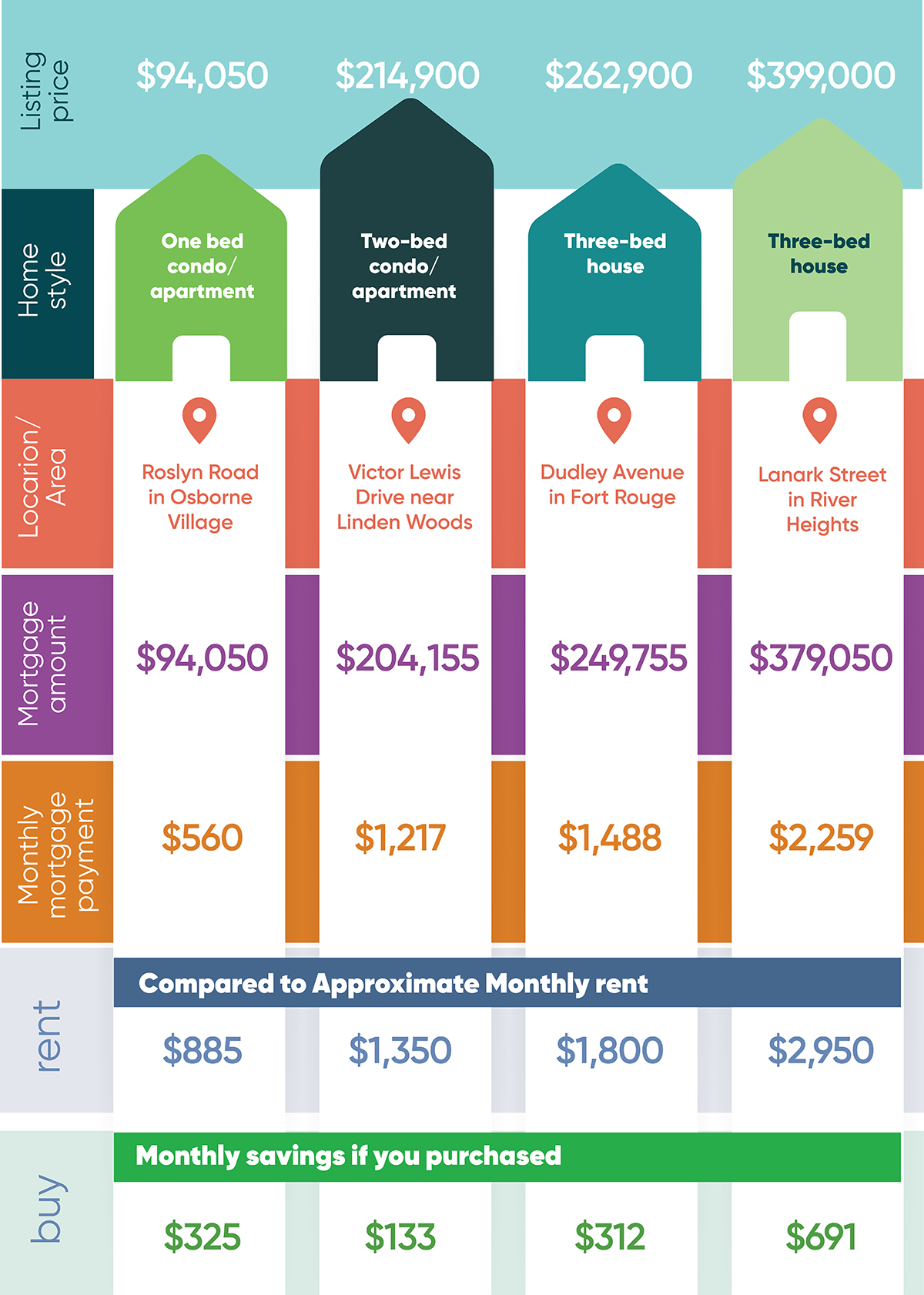Posted: September 23, 2022 by Asterisk Blog in Borrow, Money tips, buying a house, owning a home, pros and cons of renting vs. buying, rent payments, renting versus owning
Renting vs. buying: Can you afford to buy a house?
Owning a home seems to be an increasingly distant dream for many young Canadians.
A recent survey found that 80% of 18 to 28-year-old urban dwellers were worried they wouldn’t be able to afford a house in their preferred town. Further, half of them have given up on the hope of ever owning a single-family home.

Nevertheless, most Canadians hope to own a house at some point. In cities like Winnipeg, where home prices are considerably lower than the national average, homeownership should certainly still be an achievable dream, especially for anyone that pays rent on their current home.
Let’s take a close look at the pros and cons of renting versus buying, how rent costs compare to mortgage payments, and the financial help available to Canadian first-time home buyers.

Why rent your home when you can buy one?
For some Canadians, renting a home suits their lifestyle and current personal and financial goals. It can be much easier to rent a home than to buy one, and there is little in the way of commitment beyond what’s stipulated in the rental contract.
Other advantages of renting a home include:
- You typically only need to save enough money to cover the first and last month’s rent (you don’t need to save a large down payment).
- It’s relatively easy to move, which is perfect if there’s a chance you’ll want to move location in the near future.
- There are no real maintenance costs (landlords should cover these).
- You don’t pay property taxes.
However, many people feel that paying rent is a waste of money. You have nothing to show for it other than the privilege of living in someone else’s property: you’re effectively paying their mortgage for them.
For many Canadians, there are compelling advantages to owning your own home:
- Mortgage payments can be less than the cost of renting.
- You will eventually own a very large asset that typically appreciates considerably in value.
- Mortgage payments remain the same with fixed interest rate mortgage contracts, whereas rent typically increases each year.
- You can tap into your home’s equity in the future, for any reason, such as to make improvements to your home.
- Within reason, you can make whatever changes you want to your home without anyone’s permission.
- As long as you make your mortgage payments, you won’t be forced to leave your home: this stability doesn’t exist when renting.
- You don’t have to deal with landlords.
With so many compelling reasons to buy instead of rent, why do so many Canadians continue to rent vs. buy?
Usually, there are two key reasons: they feel they wouldn’t be able to afford mortgage payments and they would struggle to save for the down payment. Let’s take a closer look at both of those perceived obstacles to homeownership.
Comparison of mortgage payments versus costs of renting
Many Canadians are unaware of how much mortgage payments would cost compared to what they pay in rent. The assumption is often that it’s cheaper to rent than buy.

However, that assumption is often wrong, particularly in cities like Winnipeg, where homes are still fairly affordable for young people. We’ve made the following comparisons to show the differences between rent and mortgage payments you might find with a variety of homes in Winnipeg.
To provide meaningful comparisons of the costs of mortgage payments versus rent, we used figures for units that were for sale and rent in the same condo development and for houses of roughly the same size, on the same street.
We also based the mortgage amount on the smallest down payment possible — 5%, which is the most that many first-time home buyers can afford.

*Mortgage payments are based on the sales price as listed, with a 5% down payment; a five-year fixed mortgage rate of 5.25%; and a 25-year amortization period (the length of time it will take to pay off the mortgage).
Sales prices and rental costs from listings as of July 2022: MLS and home rental listings. This does not factor in condo fees.
As you can see, you could save hundreds of dollars each month when paying for a mortgage instead of renting, even on a fairly small home.
It’s worth mentioning that owning a condo also requires monthly maintenance fees, which aren’t included in these estimates, so you’ll want to add that into your calculations. Overall, the savings on renting vs. buying could go towards maintaining your home, yard and property taxes.
There is help for you to make the down payment on a new home
The minimum 5% down payment for a home selling at $100,000 would be $5,000, and for a home of $400,000, it would be $20,000. These figures can present quite the obstacle for many younger Canadians, but there are a number of government initiatives that can help you to make your down payment:
The Home Buyers’ Plan: This allows you to withdraw up to $35,000 from your RRSPs to use for a down payment on a home, with no tax consequences or other type of penalty. You have to be considered a first-time home buyer, and the full amount has to be repaid into an RRSP within 15 years.
The First-Time Home Buyers’ Tax Credit: This tax credit of $10,000 provides up to $1,500 in direct support to help cover closing costs.
The First-Time Home Buyer Incentive: This scheme lends first-time home buyers up to 5% (for resales) or 10% (for new builds) of the home’s purchase price to put towards a down payment. The amount (plus a limited amount of the appreciation) must be repaid when you sell your home or within 25 years of buying it.
How ACU can help you move into your first home

An ACU mortgage specialist can provide you with the financial support you need. This includes:
- Calculating how much you could borrow and a price range of homes you could afford.
- Working out how your mortgage payments would fit in with your budget.
- Strategies for putting together the down payment.
- The best mortgage option for your individual needs.
- A 120-day rate guarantee† on your qualifying rate to allow you to take your time finding your new home.
- Flexible mortgages with very competitive interest rates.

Let’s start the process of getting you into your first home.
Book an appointment online with an ACU mortgage specialist, or call 205.958.8588.
†ACU will guarantee the qualifying rate for up to 120 days from time of qualification for new mortgages. Conditions apply.
Up Next
Community stories
Read more ›
Sustainability: How ACU is turning words into action
A hand holding a seedling
Advice/Perspectives, Community stories
Read more ›
For ACU, Pride radiates outward
“I’ve always wanted to instill a change in the world for the better,” says Cristina McCourt, Financial Account Manager Trainee and member of the ACU Pride Committee, an employee-led resource…
Advice/Perspectives, Borrow, Business growth
Read more ›
Royal Aviation Museum travels to its final destination—with ACU’s help
A stone’s throw from the main terminal of Winnipeg Richardson International Airport you’ll find one of Canada’s hidden gems, where the airplanes are a little more exciting than your typical…




